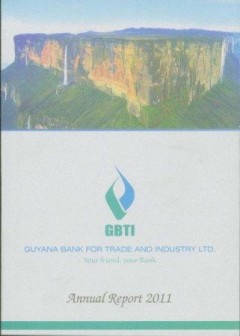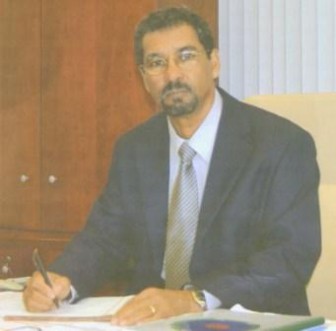Guyana Bank for Trade and Industry registered a profit of $1.3B for 2011 – up by 15% over 2010’s figure – and in the report to be presented to shareholders next month, the Bank’s Chairman says that the new parliament configuration presents a model for enhanced cooperation.
Chief Executive Officer John Tracey in his report said that total assets at the end of 2011 amounted to $75B reflecting a 20% growth over the previous period and represents 23% of the total commercial bank assets in Guyana. The latter figure for last year was 21%.
He said that Earning per share rose by 5.3% to $34.59, the return on equity was 18.4% and the return on average assets was 2.01%. The Board of Directors is proposing a final dividend of $8 to bring the total dividend to $11 per share for the year. The AGM is set for April 3rd at GBTI’s head office at Young and High streets, Kingston.

Noting that GBTI has begun “significant reviews of the bank’s operations with the aim of rationalization of expenses as well as to obtain increased value for money on services required”, Tracey said that total expenditure for the year was 2.5B compared to $2.7B in 2010. Interest expense amounted to $947M, down from $1.01B in 2010. Interest on savings deposits fell from $735M in 2010 to $643M last year. Interest on term deposits rose from $242M in 2010 to $253M last year. In relation to non-interest expenses, salaries and other staff costs rose from $709M to $840M while premises and equipment jumped from $385.4M to $596M. There was a sharp drop in other non-interest expense from $608M to $202M. This was not explained in the report. Last year’s report had said that non-interest expense increased due to the expanding branch network and increased size of operations.

GBTI’s deposit base grew by $12.9B or 25%. The bank’s share of total bank deposits is 24%, up from the 2010 figure of 22%. The savings deposit category grew by $5B in 2011 compared to $4B in 2010 and accounted for 51% of total deposits compared to 54% in 2010.
Distribution
Of a total loan portfolio of $24B, distribution has taken the biggest single chunk. It accounted for $6.9B followed by household $5.9B and services $4.2B. Manufacturing followed at $3.2B while agriculture trailed at $2.3B and was followed by mining and quarrying at $1.2B.
Tracey noted that the bank’s loan portfolio had risen by $4.7B and its share of lending in the local market to 18% last year from 17% in 2010.
Advances to the agriculture sector grew by $1.1B. Tracey noted that during the year the bank collaborated with the Ministry of Agriculture to launch the Agriculture Export Diversification Programme.
Lending to households heightened by 21% to $1B. He said the bank’s Women of Worth Loans Scheme “has performed to our satisfaction and we have seen improvements in the lives of many single women who have now developed stable incomes and households”. During the year, the bank also launched `Express Loans’ a facility that allows eligible customers to secure loans within minutes.
Looking ahead, Tracey said that the banking public requires more modern banking services such as web banking and international card services. He disclosed that during the year GBTI researched several types of banking application software and settled on `Flexcube’ from Oracle.
He added that the “political climate has entered into a new dimension with a minority government in place. This climate calls for cooperation amongst all parliamentary bodies to ensure that the legislative infrastructure is in place to effectively manage the growing economy without any disruptions”.
GBTI Chairman Robin Stoby in his analysis of the situation said “The new Parliamentary configuration presents an excellent opportunity for enhanced and mature political cooperation under the announced tri-partite arrangement and citizens will look to their leaders to produce outcomes that will benefit the country as a whole”.




